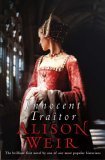
Alison Weir, our pre-eminent popular historian, has now fulfilled a life's ambition to write historical fiction. She has chosen as her subject the bravest, most sympathetic and wronged heroine of Tudor England, Lady Jane Grey.
Lady Jane Grey was born into times of extreme danger. Child of a scheming father and a ruthless mother, for whom she was merely a pawn in a dynastic power game with the highest stakes, she lived a live in thrall to political machinations and lethal religious fervour.
Jane's astonishing and essentially tragic story was played out during one of the most momentous periods of English history. As a great-niece of Henry VIII, and the cousin of Edward VI, Mary I and Elizabeth I, she grew up to realise that she could never throw off the chains of her destiny. Her honesty, intelligence and strength of
character carry the reader through all the vicious twists of Tudor power politics, to her nine-day reign and its unbearably poignant conclusion.
Alison Weir is the author of numerous non-fiction books, but Innocent Traitor is her first fiction book. She has taken the story of the Nine Day Queen - Lady Jane Grey, and given us the details of her childhood, her relationship with her parents, her introduction to court, and then the machinations behind trying to put Jane on the throne following the death of Henry VIII's son, King Edward. We are also given an insight into Jane as a very enthusiastic and somewhat dogmatic Protestant during a time of huge religious upheaval in 16th century England.
Daughter of Frances Brandon, the sister of Henry VII, Lady Jane Grey had what can only be portrayed as a miserable childhood right from birth, when her parents were very disappointed that she was not a boy. Frances was an extremely strict mother, who punished Jane excessively for even the most minor of infractions. In reality, whilst her parents were well matched in their own marriage, it appeared that they were really only concerned by what they could gain out of marrying Jane off. Right from her earliest days, Jane was raised with an eye to being an extremely accomplished, and therefore marriageable, young lady. I am sure that the Grey's were not the only court families who viewed their daughters in this way, but the portrayal given in the book emphasises the coldness of Frances Brandon in particular.
As Jane grows, she is introduced to court, and she becomes particularly attached to Queen Katherine Parr. Indeed, after Henry's death, and Queen Katherine' s marriage to Thomas Seymour, Jane goes to live with Queen Katherine, and for once in her short life, seems happy. Even then though, the reason for these living arrangements is related to trying to arrange a glittering marriage for Jane (with of course rewards galore for both her parents, and Thomas Seymour who is trying to make the arrangements).
As King Edward gets closer and closer to death, the behind the scenes wheeling and dealing continues, with the end result that Jane is married to the son of John Dudley, Duke of Northumberland and eventually declared a reluctant queen. Her reign lasted just nine days, and she was deserted by those that had put her into the role and left to the mercy of Queen Mary I.
I have to admit that I have never read any of Alison Weir's non-fiction books, so when I started reading this book it wasn't from the perspective of seeing how a historian fared in the change from non fiction to historical fiction, it was from the perspective of a completely new to me author. It has to be said that she certainly challenged herself.
This whole book is written from first person point of view. My major issue with this book is the fact that it isn't just from one or two people's POV - rather we have at least nine different views....that's a lot of head hopping. Granted that a couple of those are only for a few paragraphs, and even the with those people who we do get to know quite well, there are times where an we have a couple of paragraphs from one point of view and then we move onto the next perspective. More than once I had to go back a page or two to find out once again who was providing the narrative to be sure that I was understanding what I was reading in the correct context.
Maybe she decided to write from first person POV because third person could have been perceived as being too similar as writing non-fiction in terms of the detached viewpoint. Who knows. Personally, I felt as though there were at least three or four unnecessary narrators. Yes, they all added something to the narrative about what was happening but there may well have been other ways of achieving the dissemination of the same information.
Weir has taken the known facts, even the strange ones that seem implausible (for example, the way that Queen Katherine Parr's warrant for arrest was found and given to her, eventually meaning that Henry did not carry through with it) and then filled them out admirably, giving us a very interesting portrait of the life and times of Lady Jane Grey. It is shocking to me at times to realise how young many of these young people were when they were found guilty of treasonable offences, and executed - such a young age to be considered mature enough to be such a threat to the monarchy.
Whilst I did have issues with the first person points of view, this was still an entertaining read, and I am glad to have taken the time to read it.

No comments:
Post a Comment